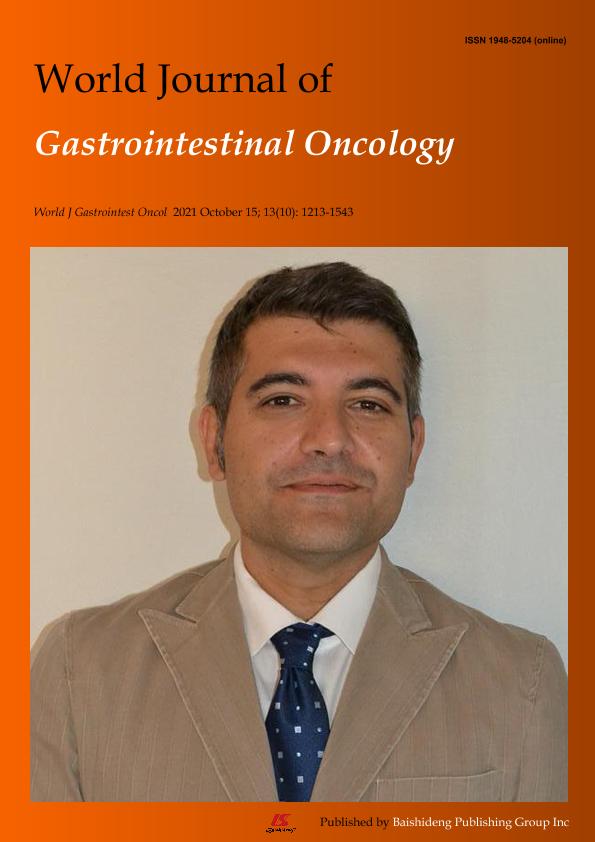Mostrar el registro sencillo del ítem
dc.contributor.author
Gigola, Graciela
dc.contributor.author
Carriere, Pedro Matias

dc.contributor.author
Novoa Díaz, María Belén

dc.contributor.author
Perdigon, Gabriela del Valle

dc.contributor.author
Zwenger, Ariel Osvaldo
dc.contributor.author
Gentili, Claudia Rosana

dc.date.available
2022-02-08T17:54:08Z
dc.date.issued
2021-10-15
dc.identifier.citation
Gigola, Graciela; Carriere, Pedro Matias; Novoa Díaz, María Belén; Perdigon, Gabriela del Valle; Zwenger, Ariel Osvaldo; et al.; Survival effect of probiotics in a rat model of colorectal cancer treated with capecitabine; W J G Press; World Journal of Gastrointestinal Oncology; 13; 10; 15-10-2021; 1518-1531
dc.identifier.issn
1007-9327
dc.identifier.uri
http://hdl.handle.net/11336/151588
dc.description.abstract
BACKGROUND: Probiotics are used to manage a number of gastrointestinal disorders due to their beneficial properties. Clinical reports showed that probiotics also improve the life quality of patients with colorectal cancer (CRC) subjected to oncologic treatment. In a CRC animal model, probiotics supplementation has the potential to decrease the formation of aberrant crypts and ameliorate tumor malignancy, enhancing the antitumor effect of 5-fluorouracil (5-FU) chemotherapy. Based on these data, we hypothesize that the administration of probiotics impact positively in the overall survival and life quality of rats with CRC under the treatment of capecitabine, which is the pro drug of 5-FU. AIM To evaluate the probiotics effects in a rat CRC model treated with capecitabine and followed until the end of life.
METHODS: 1,2-Dimethylhidrazine dihydrochloride (1,2-DMH) was employed as carcinogen inductor of CRC. Fifty male Wistar-Lewis rats were randomly assigned to one of five following groups: Control (n = 5), Control + probiotics (Control-P group, n = 5), 1,2-DMH alone (DMH group, n = 10), 1,2-DMH + capecitabine (DMH-C group, n = 10), 1,2-DMH + probiotics (DMH-P group, n = 10) and 1,2-DMH + capecitabine + probiotics (DMH-C-P group, n = 10). All parametric data were expressed as the mean ± SD. The statistical significance of differences was analyzed using one-way ANOVA. Data were analyzed with InfoStat software. The results were considered statistically significant at P < 0.05. Overall survival was evaluated with the Kaplan-Meier estimator with the log-rank test.
RESULTS: The data of mean overall survival for DMH, DMH-P, DMH-C, DMH-C-P, Control and Control-P groups were 250 d [95% confidence interval (CI): 242.5-253.1], 268 d (95%CI: 246.3-271.4), 380 d (95%CI: 337.8-421.9), 480 d (95%CI: 436.9-530.7), 588 d (95%CI: 565.8-609.3) and 590 d (95%CI: 564.3-612.9), respectively, with a significant difference between DMH-C and DMH-C-P groups (P = 0.001). Comparing all groups by Kaplan-Meier estimator, we found a significantly different in the overall survival of DMH and DMH-P groups respect to DMH-C (P = 0.001) and DMH-C-P (P = 0.001) groups; interestingly, there were no meaningful differences between Control, Control-P and DMH-C-P groups (P = 0.012). The tendency of change in body weight gain of the rats at 90 d of finishing DMH administration was similar in Control group compared with DMH-C and DMH-C-P groups; however, and of relevance, DMH-C-P group has experienced a higher body weight gain at the end of animal's life than DMH-C group (P = 0.001). In DMH-C-P group we found a positive effect of probiotics in clinical manifestations since diarrhea, constipation and blood stool were absenting. Also, the tumor burden was lower in DMH-C-P than DMH-C, DMH-P or DMH groups (1.25 vs 1.81 vs 3.9 vs 4.8 cm2, respectively). DMH-C and DMH-C-P groups showed only mucinous carcinoma type while in other DMH groups the tumor types were variable. However, mucinous carcinoma from DMH-C-P group showed invasion until muscularis propria layer. Interestingly, metastatic lymph node was observed in DMH, DMH-C and DMH-P groups but not in DMH-C-P. All animals in Control group died from natural causes without objective injuries. All animals of DMH and DMH-P groups died from tumor complications (i.e., obstruction or intestinal perforation); however, this cause was seen only in 44.5% of DMH-C and DMH-C-P groups.
CONCLUSION: Probiotics administration improves life quality of rats with CRC under capecitabine treatment and also has a positive effect in the overall survival of these animals treated with this drug.
dc.format
application/pdf
dc.language.iso
eng
dc.publisher
W J G Press

dc.rights
info:eu-repo/semantics/openAccess
dc.rights.uri
https://creativecommons.org/licenses/by-nc/2.5/ar/
dc.subject
ANIMAL EXPERIMENTATION
dc.subject
CAPECITABINE
dc.subject
COLORECTAL CANCER
dc.subject
LIFE QUALITY
dc.subject
PROBIOTICS
dc.subject
SURVIVAL
dc.subject.classification
Bioquímica y Biología Molecular

dc.subject.classification
Ciencias Biológicas

dc.subject.classification
CIENCIAS NATURALES Y EXACTAS

dc.title
Survival effect of probiotics in a rat model of colorectal cancer treated with capecitabine
dc.type
info:eu-repo/semantics/article
dc.type
info:ar-repo/semantics/artículo
dc.type
info:eu-repo/semantics/publishedVersion
dc.date.updated
2021-12-03T19:22:33Z
dc.identifier.eissn
1948-5204
dc.journal.volume
13
dc.journal.number
10
dc.journal.pagination
1518-1531
dc.journal.pais
Estados Unidos

dc.journal.ciudad
Pleasanton
dc.description.fil
Fil: Gigola, Graciela. Consejo Nacional de Investigaciones Científicas y Técnicas. Centro Científico Tecnológico Conicet - Bahía Blanca. Instituto de Ciencias Biológicas y Biomédicas del Sur. Universidad Nacional del Sur. Departamento de Biología, Bioquímica y Farmacia. Instituto de Ciencias Biológicas y Biomédicas del Sur; Argentina
dc.description.fil
Fil: Carriere, Pedro Matias. Consejo Nacional de Investigaciones Científicas y Técnicas. Centro Científico Tecnológico Conicet - Bahía Blanca. Instituto de Ciencias Biológicas y Biomédicas del Sur. Universidad Nacional del Sur. Departamento de Biología, Bioquímica y Farmacia. Instituto de Ciencias Biológicas y Biomédicas del Sur; Argentina
dc.description.fil
Fil: Novoa Díaz, María Belén. Consejo Nacional de Investigaciones Científicas y Técnicas. Centro Científico Tecnológico Conicet - Bahía Blanca. Instituto de Ciencias Biológicas y Biomédicas del Sur. Universidad Nacional del Sur. Departamento de Biología, Bioquímica y Farmacia. Instituto de Ciencias Biológicas y Biomédicas del Sur; Argentina
dc.description.fil
Fil: Perdigon, Gabriela del Valle. Consejo Nacional de Investigaciones Científicas y Técnicas. Centro Científico Tecnológico Conicet - Tucumán. Centro de Referencia para Lactobacilos; Argentina
dc.description.fil
Fil: Zwenger, Ariel Osvaldo. Centro de Estudios Clínicos Saga; Chile
dc.description.fil
Fil: Gentili, Claudia Rosana. Consejo Nacional de Investigaciones Científicas y Técnicas. Centro Científico Tecnológico Conicet - Bahía Blanca. Instituto de Ciencias Biológicas y Biomédicas del Sur. Universidad Nacional del Sur. Departamento de Biología, Bioquímica y Farmacia. Instituto de Ciencias Biológicas y Biomédicas del Sur; Argentina
dc.journal.title
World Journal of Gastrointestinal Oncology
dc.relation.alternativeid
info:eu-repo/semantics/altIdentifier/doi/http://dx.doi.org/10.4251/wjgo.v13.i10.1518
dc.relation.alternativeid
info:eu-repo/semantics/altIdentifier/url/https://www.wjgnet.com/1948-5204/full/v13/i10/1518.htm
Archivos asociados
